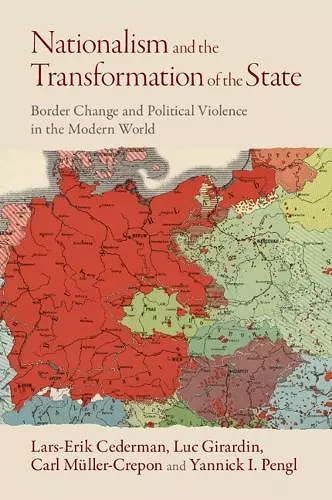Nationalism and the Transformation of the State
Border Change and Political Violence in the Modern World
Lars-Erik Cederman author Luc Girardin author Carl Müller-Crepon author Yannick I Pengl author
Format:Paperback
Publisher:Cambridge University Press
Published:23rd Oct '25
Currently unavailable, and unfortunately no date known when it will be back
This paperback is available in another edition too:
- Hardback£90.00(9781009527798)

Challenges conventional approaches to nationalism by using historical maps to analyze how ethnic nations affected border change and conflict.
Using historical maps to show how ethnic nations have reshaped state borders and caused conflict since the French Revolution, this book traces the effects that explain current geopolitical instability in Europe and beyond. This title is also available as Open Access on Cambridge Core.Following Russia's annexation of Crimea in 2014, the recent conflicts in Ukraine and the Middle East signals the return of geopolitics. This book challenges conventional approaches that ignore border change, arguing that geopolitics is driven by nationalism and focusing on how nationalism transforms the state. Using geocoded historical maps covering state borders and ethnic groups in Europe, the authors' spatial approach shows how, since the French Revolution, nationalism has caused increasing congruence between state and national borders and how a lack of congruence increased the risk of armed conflict. This macroprocess is traced from early modern Europe and widens the geographic scope to the entire world in the mid-twentieth century. The analysis shows that the risk of conflict may be increased by how nationalists seeking to revive past golden ages and restore their nations' prestige respond to incongruent borders. This title is also available as Open Access on Cambridge Core.
'This magnificent work, through groundbreaking empirical research, demonstrates the destabilizing power of ethnonationalism contesting the spatial incongruities between state boundaries and the contours of cultural difference. In so doing, it challenges conventional wisdoms and sets a new standard for thinking about war, separatism, ethnic cleansing, and the transformation of the state system.' Mark R. Beissinger, Henry W. Putnam Professor in the Department of Politics, Princeton University
'Among the very many things that make this book an instant classic, let me emphasize two. It brings nationalist agents and their narratives back in to explain the size and nature of contemporary states. It deploys amazing empirics – at a level unseen of in previous work on nation-state formation.' Carles Boix, Robert Garrett Professor of Politics and Public Affairs, Princeton University
'This book is a milestone in three massively important literatures: on nationalism, state formation and war. It sets the standard for new generations, a standard that will be very hard to match, let alone beat. It is rich in conceptual innovation, analytical clarity, and empirical analysis. It is a seminal contribution to our whole discipline.' Hein Goemans, Professor of Political Science and Director of the Peter D. Watson Center for Conflict & Cooperation, University of Rochester
'This tour de force of scholarly teamwork theorizes and empirically tests how nationalism reshapes states through border change and conflict. Using a rich array of historical data, it shows how state-nation incongruence drives instability – illustrated by cases like Russia's annexation of Crimea. An essential contribution, it sheds new light on nationalism's enduring impact on state evolution and global order.' Beth Simmons, Andrea Mitchell University Professor of Law and Political Science, University of Pennsylvania
'Did war make the state and the state make war? And if so, why do powerful states begin to shrink rather than grow and conquer, as our dominant theories predict? Cederman and his co-authors provide rigorous and nuanced answers to these and other questions in this deeply impressive and pioneering book. While confirming that nations are modern and constructed, they show that ethnic histories across the world for the past two centuries are a major engine of border change. This tour de force should be read by anyone interested in the politics of nationalism, state formation, and state change.' Maya Tudor, Professor of Politics and Public Policy, Blavatnik School of Government, University of Oxford
ISBN: 9781009527804
Dimensions: 229mm x 152mm x 21mm
Weight: 250g
394 pages